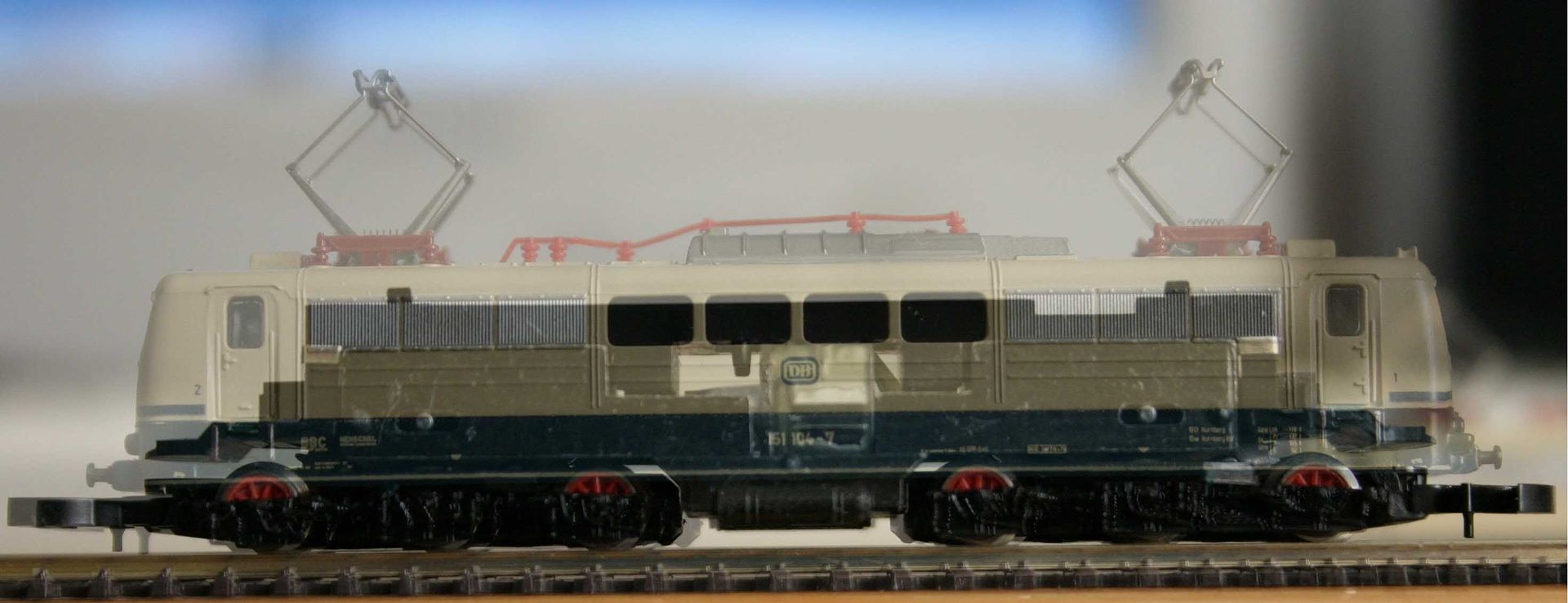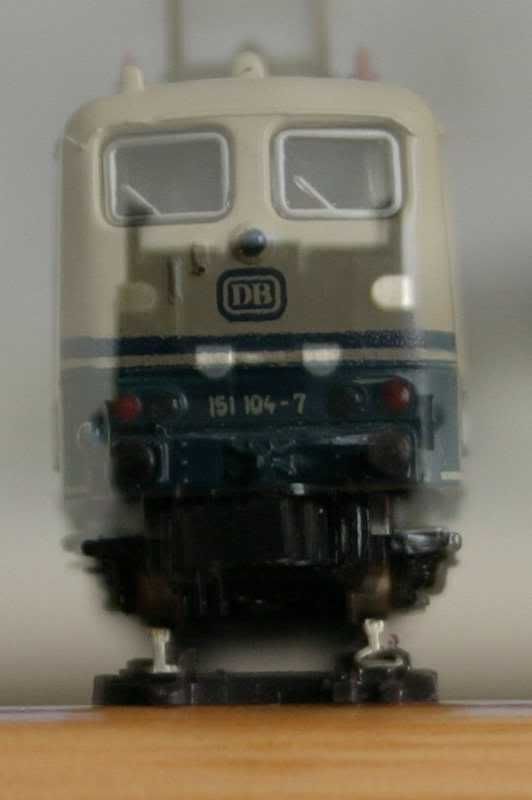- Posts: 148
- Thank you received: 0
flywheels
- andyjbj
- Offline
- Junior Member
-

Please Log in or Create an account to join the conversation.
- Havoc
- Offline
- Junior Member
-

- Posts: 187
- Thank you received: 0
Please Log in or Create an account to join the conversation.
- kimvellore
- Offline
- New Member
-

- Posts: 6
- Thank you received: 0
Kim
Please Log in or Create an account to join the conversation.
- Havoc
- Offline
- Junior Member
-

- Posts: 187
- Thank you received: 0
Flywheels are least effective at lower speed (effectiveness is square of RPM)
Don't you mean at higher speed?
Anyhow, another thing is that flywheels need to concentrate the most of their weight at the outside rim and that has to be as large as possible. At the sizes involved in Z this won't amount to much.
It is the motor that you see on the newer locos that makes it run better, and it has come a long way.
Agreed on that. The difference between the old 3-pole motor and the new 5-pole. Going to Faulhabers would still be better but I don't think there are plug-in replacements available.
Please Log in or Create an account to join the conversation.
- bambuko
- Offline
- Junior Member
-

- Posts: 143
- Thank you received: 0
No, he means what he says
Flywheels are least effective at lower speed (effectiveness is square of RPM)
Don't you mean at higher speed?
...
Most effective at high speed - hence the flywheel is attached to motor shaft (high rpm), not to the loco wheel axle (low/geared down rpm)
Of course they are most needed at low speeds, but that's another story ...
ps he is also right when he says that you will get more improvement by using better motor than by adding flywheel to a crappy motor
Please Log in or Create an account to join the conversation.
- David K. Smith
- Offline
- Premium Member
-

- Posts: 446
- Thank you received: 40
The AZL mechanism has a much lower-friction drivetrain, and the effect of the flywheels can be seen; however, it is only seen at high speeds. Cut the power of the loco at full throttle, and it will coast a little (while the M-T loco will stop dead in its tracks). However, if it is running at low speed, there will be no coasting. Why? The flywheel is only effective at high speeds, as noted by Kim.
It's kind of sad, because if Z scale manufacturers did away with flywheels, we'd have locos that run the same and cost less. But then sales would likely drop because people will think they're not as good. When you get something into their heads, it can be really hard to fix it...
Please Log in or Create an account to join the conversation.
- bambuko
- Offline
- Junior Member
-

- Posts: 143
- Thank you received: 0
As you guys say - get the axle resistance low, use decent coreless motor, make loco frame from sintered tungsten moulding and Bob is your uncle
Flywheel is a gimmick
Please Log in or Create an account to join the conversation.
- Havoc
- Offline
- Junior Member
-

- Posts: 187
- Thank you received: 0
No, he means what he says and he is right
I see now. shouldn't post when drinking
Please Log in or Create an account to join the conversation.
- ausman2001
- Offline
- Senior Member
-

- Posts: 278
- Thank you received: 1
No, he means what he says and he is right
I see now. shouldn't post when drinking
Thanks to all for the contributions - this has been a most illuminating topic and I've learned a lot. I had been one of those who thought that flywheels always improved performance.
Please Log in or Create an account to join the conversation.
- Mr.JA
- Offline
- Elite Member
-

- Posts: 562
- Thank you received: 86
It's kind of sad, because if Z scale manufacturers did away with flywheels, we'd have locos that run the same and cost less. But then sales would likely drop because people will think they're not as good. When you get something into their heads, it can be really hard to fix it...
Thank you, Mr. Smith!
Once AGAIN, you have presented an opposing view that has provided valueable information.
Alex
Tokyo, Japan
Please Log in or Create an account to join the conversation.
- zthek
- Offline
- Junior Member
-

- Posts: 137
- Thank you received: 0
...you can remove the flywheels and the loco will run exactly the same.
It's not true. Locomotives equipped with flywheel run smoother with substantially less "jerking". To call the flywheel a marketing gimmick is highly irresponsible. A real scientific and objective test can prove the advantage of flywheels regardless the type of motor.
Lajos
Please Log in or Create an account to join the conversation.
- David K. Smith
- Offline
- Premium Member
-

- Posts: 446
- Thank you received: 40
I had been one of those who thought that flywheels always improved performance.
Actually, I used to think the same. I believe I inherited this line of thinking from larger scales, where flywheels could make an impact, especially with traditional pole-type motors. But there comes a point of diminishing returns, and Z scale is pretty much the point where flywheels make virtually no practical difference.
This is not to say flywheels could never make a difference; for instance, if a novel mechanism were designed for a big fat cab loco, where one could fit a pair of comparatively massive tungsten flywheels, and with nice low-friction trucks, then things might be different. Doubtful if many of us could afford such a beast, and it won't work for hood units...
Please Log in or Create an account to join the conversation.
- David K. Smith
- Offline
- Premium Member
-

- Posts: 446
- Thank you received: 40
...you can remove the flywheels and the loco will run exactly the same.
It's not true. Locomotives equipped with flywheel run smoother with substantially less "jerking". To call the flywheel a marketing gimmick is highly irresponsible. A real scientific and objective test can prove the advantage of flywheels regardless the type of motor.
Lajos
Sorry, but I have run some performance tests, not "scientific," but sufficient to prove for me that they have no practical benefit. With the very same motor and drive train, with and without flywheels, I found no discernable difference in the behavior of the locomotive.
Larger scales, flywheels absolutely help. Three-pole motors, flywheels absolutely help. Modern Z scale locos with coreless motors, I find no measurable difference in performance.
Please Log in or Create an account to join the conversation.
- Mr.JA
- Offline
- Elite Member
-

- Posts: 562
- Thank you received: 86
I knew these comments would turn this subject in to a hot debate. Let's see how long this goes before someone wants to moderate it.
Please Log in or Create an account to join the conversation.
- David K. Smith
- Offline
- Premium Member
-

- Posts: 446
- Thank you received: 40
And, so... it begins.
I knew these comments would turn this subject in to a hot debate. Let's see how long this goes before someone wants to moderate it.
Naturally, when two different people make two different observations, there will be clashes. I have reported what I have observed and measured with Z scale locos having coreless motors.
Actual mileage, as they say, will vary...
Please Log in or Create an account to join the conversation.
- Mr.JA
- Offline
- Elite Member
-

- Posts: 562
- Thank you received: 86
I always enjoy reading your blog and website.
I'm just waiting for the two representatives from the two manufactures to log-in and provide their rebuttles
Alex
Please Log in or Create an account to join the conversation.
- zthek
- Offline
- Junior Member
-

- Posts: 137
- Thank you received: 0
Lajos
Please Log in or Create an account to join the conversation.
- pmx
- Offline
- New Member
-

- Posts: 5
- Thank you received: 0
Then Test#2 add in a drive-train and compare. Will the force the flywheel adds be enough to over come the friction in drive-train?
I won't presume to know the answer to these questions. I only seek to try establishing objective tests.
~Paul E.
Please Log in or Create an account to join the conversation.
- David K. Smith
- Offline
- Premium Member
-

- Posts: 446
- Thank you received: 40
Not to sound contrary, but shouldn't test#1 be conducted with a 8mm motor since this would be the predominant size in Z today?
Then Test#2 add in a drive-train and compare. Will the force the flywheel adds be enough to over come the friction in drive-train?
I won't presume to know the answer to these questions. I only seek to try establishing objective tests.
~Paul E.
Thank you Paul. Tests with a motor alone will always show improvement with a flywheel. Now add the friction of the entire drive train (try an M-T unit), and just for kicks, add the load of a few pieces of rolling stock. It ought to be a test that reflects real world conditions, after all, since we don't place bare motors on our track and watch them spin...
Please Log in or Create an account to join the conversation.
- zthek
- Offline
- Junior Member
-

- Posts: 137
- Thank you received: 0
Lajos
PS: Don't write off the 10 mm (even 12 mm) motors yet.
Please Log in or Create an account to join the conversation.


















